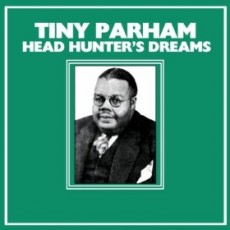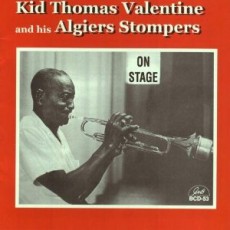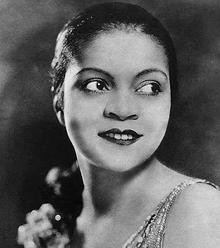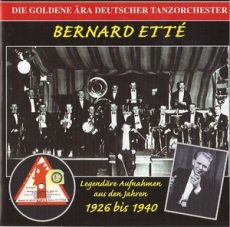
Daily Dose Of Jazz…
Tiny Parham was born Hartzell Strathdene Parham on February 25, 1900 in Winnipeg, Canada. The pianist and bandleader grew up in Kansas City and worked at The Eblon Theatre, mentored by ragtime pianist and composer James Scott. He would later tour with territory bands in the Southwest before moving to Chicago in 1926.
He is best remembered for the recordings he made in Chicago between 1927 and 1930 working with Johnny Dodds along with several female blues singers and with his own band. Most of the musicians Parham played with are not well known in their own right, though cornetist Punch Miller, banjoist Papa Charlie Jackson, saxophonist Junie Cobb and bassist Milt Hinton are exceptions.
His entire recorded output for Victor are highly collected and appreciated as prime examples of late 1920’s jazz. Tiny favored the violin and many of his records have a surprisingly sophisticated violin solos, along with the typical upfront tuba, horns and reeds.
After 1930 he found work in theater houses, especially as an organist and his last recordings were made in 1940. The cartoonist R. Crumb included a drawing of Parham in his classic 1982 collection of trading cards and later book “Early Jazz Greats” of which Parham was the only non-American born so included in addition to the book’s bonus cd containing a Parham track.
Tiny Parham passed away on April 4, 1943 in Milwaukee, Wisconsin.
More Posts: bandleader,history,instrumental,jazz,music,piano

Daily Dose Of Jazz…
Alonzo “Lonnie” Johnson was born on February 8, 1899 in New Orleans, Louisiana into a musical family. He studied violin, piano and guitar as a child, and learned to play various other instruments including the mandolin, but concentrated on the guitar throughout his professional career. By his late teens, he played guitar and violin in his father’s family band and with trumpeter Punch Miller in the Storyville clubs.
In 1917, Johnson joined a revue that toured England, returning home two years later to find that all of his family, except his brother James, had died in the 1918 influenza epidemic. Settling in St. Lois with his brother James the two embarked on a duo performance, though Lonnie also worked the riverboats in the orchestras of Charlie Creath and Fate Marable.
Johnson would go on to enter a blues contest in 1925 winning a recording contract with Okeh Records, record in New York with Victoria Spivey and tour with Bessie Smith’s T.O.B.A. show. By 1927, he recorded in Chicago as a guest artist with Louis Armstrong and His Hot Five, and in 1928 he was in the studio recording with Duke Ellington and with the group The Chocolate Dandies playing 12 string guitar solos on many these early recordings.
With the temporary demise of the recording industry in the Great Depression, Johnson went to work in the steel mills. However, post WWII he revived his career and would record for Decca, top the Billboard “Race Records” charts, tour England, move to Philadelphia, and record for Prestige Records. He settled in Toronto, Canada until he was sidelined when hit by a car, injuries from which he never fully recovered.
Lonnie is credited with pioneering the role of jazz guitar and is recognized as the first to play single-string guitar solos and who influenced such guitarists as Charlie Christian and Django Reinhardt. Guitarist, songwriter, jazz and blues singer Lonnie Johnson passed away on June 16, 1970.
More Posts: guitar

Daily Dose Of Jazz…
Kid Thomas was born Thomas Valentine on February 3, 1896 in Reserve, Louisiana and moved to New Orleans in his youth. Gaining a reputation as a hot trumpet man in the early 1920s, he started his own band in 1926, basing himself in the New Orleans suburb of Algiers.
Unaffected by the influence of Louis Armstrong and later developments of jazz, Kid Thomas had perhaps the city’s longest lasting old-style traditional jazz dance band, continuing to play in his distinctive hot, bluesy sometimes percussive style. Although Valentine played popular tunes of the day even into the rock and roll era, he played everything in a style of a New Orleans dance hall of the early 1920s.
Kid Thomas Valentine started attracting a wider following with his first recordings in the 1950s and played regularly at Preservation Hall from the 1960s through the 1980s. He toured extensively for the Hall, including a Russian tour, as a guest at European clubs and festivals, and working with various local bands as well as his own. During the 1960s Kid Thomas recorded extensively for the Jazz Crusade and GBH labels both with his own band and with Big Bill Bissonnette’s Easy Riders Jazz Band. He made over 20 tours with the Easy Riders in the U.S. Northeast.
By the mid 1980s, as Thomas’s strength started to wane, Preservation Hall management brought in Wendell Brunious, who took over much of his trumpet duties, though Kid continued to lead the band. On June 18, 1987, trumpeter Kid Thomas Valentine passed away.
More Posts: trumpet

Daily Dose Of Jazz…
Florence Mills: The “Queen of Happiness” Who Lit Up the Stage Too Briefly
Florence Winfrey was born on January 25, 1895, in Washington, D.C., and from the moment she could carry a tune, it was clear something special was happening. By age six, she was already performing duets with her two older sisters, and soon the trio formed a polished vaudeville act they called “The Mills Sisters.” The act did well enough to draw audiences, but eventually her sisters chose different paths, leaving the stage behind.
Refusing to Give Up the Dream
Florence, however, was determined to pursue a career in show business—quitting simply wasn’t in her vocabulary. She joined forces with Ada Smith, Cora Green, and Carolyn Williams to form a group called the “Panama Four,” which achieved moderate success on the vaudeville circuit. But Mills was destined for something bigger.
The Show That Changed Everything
Her breakthrough came in 1921 when she landed a role in the groundbreaking Broadway musical Shuffle Along. This wasn’t just another show—it’s widely credited with igniting the Harlem Renaissance, proving that Black artists could create commercially successful, artistically excellent work that appealed to integrated audiences. Mills’ performance captivated theatergoers and critics alike.
From there, her star ascended rapidly. She played the legendary Palace Theatre—the ultimate goal for any vaudevillian—and became an international sensation with the hit show Lew Leslie’s Blackbirds, where her signature song “I’m a Little Blackbird Looking for a Bluebird” became an anthem of hope and aspiration that resonated far beyond the footlights.
“The Queen of Happiness”
Mills became known as the “Queen of Happiness” for her effervescent stage presence, delicate yet expressive voice, and winsome, wide-eyed beauty that seemed to radiate joy. She graced the pages of Vogue and Vanity Fair—extraordinary recognition for a Black performer in the 1920s, when such visibility was rare and hard-won.
She wasn’t just entertaining audiences; she was breaking barriers and changing perceptions about what Black artists could achieve on the world stage.
A Tragic, Premature End
But success came at a devastating cost. By 1926, after more than 250 grueling performances of Blackbirds in London, Mills’ health began to fail. Exhausted and weakened, she developed tuberculosis—a disease that was particularly deadly in that era. Then, in a cruel twist of fate, she contracted an infection following an appendicitis operation.
On November 1, 1927, Florence Mills died at just 32 years old, her brilliant light extinguished far too soon.
A Legacy That Endures
Her death sent shockwaves through the entertainment world and the Harlem community. Duke Ellington memorialized her in his haunting composition “Black Beauty,” while Fats Waller paid tribute with “Bye Bye Florence”—both testament to the profound impact she had on her fellow artists.
The residential building at 267 Edgecombe Avenue in Harlem’s prestigious Sugar Hill neighborhood bears her name, ensuring that residents and visitors alike remember the woman who helped put Harlem on the cultural map. And in 2012, author Alan Schroeder introduced a new generation to her story with the children’s book Baby Flo: Florence Mills Lights Up the Stage, published by Lee & Low.
What Might Have Been
It’s impossible not to wonder what Florence Mills might have achieved had she lived longer. At 32, most performers are just hitting their stride. Instead, we’re left with recordings that only hint at her magic, reviews that describe her incandescent presence, and the knowledge that for a brief, shining moment, she was the brightest star in the sky.
The “Queen of Happiness” brought joy to millions but didn’t live long enough to fully enjoy the kingdom she helped create. Her story is both inspiring and heartbreaking—a reminder that talent and determination can change the world, even if the world doesn’t get to keep you as long as it should.
More Posts: vocal

Daily Dose Of Jazz…
Bernard Etté was born on September 13, 1898 in Kassel, Germany. The son of a hairdresser, he studied music formally at the Louis Spohr Conservatory in Kassel. He initially worked with Carl Robrecht as an instrumentalist, playing piano and banjo in addition to violin.
In the early 1920s he assembled his own ensemble, and took up a residency in Berlin, Germany and performed on radio. The group also recorded in the 1920s, often with traveling American musicians. During the 1930s, as the Nazi party rose to power, Etté shifted away from jazz to light music, and led a large orchestra during World War II.
He played for wounded soldiers on behalf of the Nationalsozialistische Volkswohlfahrt in 1940 and for prison overseers at Auschwitz in 1944. After the war, he moved to the United States but was unsuccessful in adapting to new stylistic trends when he attempted a new career.
Returning to Germany, he led bands for luxury retreats in the East Frisian Islands and schlager and operetta backing bands in central Germany. By the end of the 1950s he quit actively playing music, and lived out his last years in an old folk’s home.
Bernard Etté, jazz and light music violinist and conductor died on September 26, 1973 in Mühldorf, Bavaria, Germany.
More Posts: bandleader,conductor,history,instrumental,jazz,music,violin


